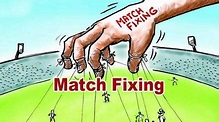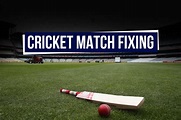Are Cricket Matches Fixed? Understanding the Dark Side of the Game

Cricket is one of the world’s most beloved sports, enjoyed by millions of fans around the globe. But alongside the excitement, there’s a burning question that always surfaces: Are cricket matches fixed?
In this article, we’ll explore the truth behind match-fixing in cricket, break down how it happens, and understand its impact on the game. We’ll also discuss the measures cricket authorities are taking to prevent it and how match-fixing scandals have affected the sport’s integrity.
What Is Match-Fixing in Cricket?

Match-fixing is when players or officials deliberately manipulate a match’s outcome for financial gain, typically by influencing the betting odds. This can include actions like deliberately underperforming, throwing the game, or helping a particular outcome unfold—whether it’s a specific number of runs or a target score.
In a fixed match, the outcome is predetermined by players who have been influenced or coerced by illegal betting syndicates. Match-fixing damages the sport’s credibility and takes away the fairness of the game, leaving fans questioning its authenticity.
Why Do Players Fix Matches in Cricket?

Players fix matches for several reasons, but the primary motivator is often financial gain. In addition to that, there are other reasons that players might engage in match-fixing:
- Gambling Addiction: Players involved in illegal betting may fix matches to cover their debts or gambling losses.
- Financial Incentives: Criminal syndicates or illegal bookies might offer players large sums of money to influence the outcome of a game.
- Coercion or Blackmail: In some cases, players are threatened or coerced into fixing matches against their will, especially if they’re in vulnerable situations.
Regardless of the reasons, match-fixing undermines the spirit of cricket and the fairness that the sport stands for.
Real-Life Examples of Fixed Cricket Matches
There have been several infamous cases where cricket matches were fixed, shaking the sport to its core. Let’s take a look at two of the most well-known incidents:
The 2010 Spot-Fixing Scandal in Pakistan
In 2010, three Pakistani cricketers—Salman Butt, Mohammad Asif, and Mohammad Amir—were caught in a spot-fixing scandal during a series against England. These players deliberately bowled no-balls to fulfill a betting contract with bookies. The scandal was exposed in a sting operation by a leading news outlet, and the players were banned and sentenced to prison.
The impact of this scandal was massive, both for the players involved and for the credibility of international cricket. Fans and experts alike began to question whether other matches were also fixed.
The 2000 Match-Fixing Scandal Involving Hansie Cronje
One of the earliest and most well-known cases of match-fixing came in 2000 when Hansie Cronje, the South African cricket captain, was found guilty of accepting bribes from bookmakers to fix matches. The news sent shockwaves through the cricket world. Cronje was banned from cricket for life, and the scandal highlighted the vulnerability of cricket to corruption.
These two cases show how match-fixing not only destroys the careers of players but also damages the reputation of cricket itself. The sport’s integrity is compromised, leaving fans disillusioned.
How Are Authorities Preventing Match-Fixing in Cricket?

The International Cricket Council (ICC) and national cricket boards have taken several steps to combat match-fixing and ensure that cricket remains a fair sport. Here are some of the most significant measures taken to prevent match-fixing:
ICC’s Anti-Corruption Unit (ACU)
The ICC Anti-Corruption Unit plays a critical role in monitoring and investigating any suspicious activity in the world of cricket. This unit works closely with other cricket boards, law enforcement agencies, and betting regulators to identify and stop corrupt practices.
The ACU also educates players, coaches, and officials about the dangers of match-fixing and ensures they understand the consequences of getting involved in illegal betting.
Education and Awareness Programs for Players

The ICC runs educational programs that inform players and officials about the risks of match-fixing and gambling. These programs aim to raise awareness of the ethical standards required in cricket. By teaching the players about the legal and ethical consequences of match-fixing, they hope to prevent players from falling prey to corrupt influences.
Strict Penalties for Those Found Guilty of Fixing Matches
One of the most important tools in combating match-fixing is the strict penalties imposed on those caught fixing matches. Players found guilty of fixing matches face long bans, heavy fines, and even criminal charges in some cases. This helps deter others from engaging in corrupt activities.
Monitoring Suspicious Betting Patterns
In the modern era, technology plays a significant role in preventing match-fixing. Authorities monitor unusual betting patterns across global betting platforms. When they detect abnormal betting trends that suggest a match may be fixed, they can investigate further and take action before the game even starts.
The Importance of Stopping Match-Fixing

Match-fixing has severe consequences for cricket, affecting the sport’s integrity and reputation. Here’s why it’s crucial to fight against it:
Erosion of Trust in the Game
Fans watch cricket because they trust in its fairness. If they start to suspect that matches are fixed, they will lose faith in the game. This loss of trust can lead to a decline in viewership and sponsorships, severely affecting the sport’s financial and cultural standing.
Damage to Players’ Careers and Reputations

Once a player is found guilty of match-fixing, their career is effectively over. They are banned for life, and their reputation is tarnished forever. For example, Mohammad Amir, a player who was once hailed as a prodigy, faced a long suspension and public outrage after his involvement in the 2010 scandal.
Threat to the Integrity of Cricket
Cricket is a game based on fair play and sportsmanship. Match-fixing undermines these values and damages the sport’s global standing. As more incidents of match-fixing surface, the credibility of the sport erodes, leading to questions about the authenticity of matches and tournaments.
How Can Cricket Fans Help Stop Match-Fixing?
As a cricket fan, you can also play an important role in protecting the integrity of the sport. Here’s how:
- Stay Informed: Understand what match-fixing is and be aware of the signs. Watch for unusual betting trends or strange outcomes in matches.
- Report Suspicious Activity: If you notice anything unusual, report it to the authorities. The ICC and national boards often have hotlines or online portals for reporting match-fixing.
- Support Clean Cricket: Encourage players and teams that uphold the sport’s values and play fairly. Your support helps ensure that cricket remains a clean and transparent sport.
Conclusion: The Ongoing Fight Against Match-Fixing in Cricket
So, are cricket matches fixed? While the answer is unfortunate and unsettling, we can say that match-fixing has happened in the past. However, the ongoing efforts by cricket authorities to combat match-fixing and maintain the integrity of the sport are making a significant impact. The ICC, national boards, and fans like you all play a role in keeping cricket fair and free from corruption.
Cricket will continue to be a thrilling sport as long as we all work together to maintain its honesty and transparency. Let’s protect the game we love and ensure that match-fixing doesn’t ruin it for future generations.
FAQs About Match-Fixing in Cricket
1. What is match-fixing in cricket?
Match-fixing in cricket refers to the act of deliberately manipulating the outcome of a game for personal or financial gain. This can involve players or officials making specific decisions during a match that influence the final result, such as deliberately underperforming or altering the flow of the game to favor one outcome. The purpose of match-fixing is often to align with illegal betting schemes, where bookies or gambling syndicates place high bets on specific events during the game.
2. How do players get involved in fixing cricket matches?
Players may get involved in match-fixing for several reasons:
- Financial temptation: Players may be offered large sums of money by bookmakers or criminal syndicates to influence the result of a match or specific events during the game.
- Gambling addiction: Some players may become addicted to gambling and start fixing matches to cover their debts.
- Coercion: In some cases, players are blackmailed or forced into fixing matches by people who have influence over them.
- Peer pressure: In some instances, players may be encouraged or pressured by others in the team or external individuals to engage in spot-fixing or match-fixing.
3. Are cricket matches fixed in all tournaments?
While match-fixing has happened in several high-profile tournaments, including Test matches, One Day Internationals (ODIs), and T20 leagues, it is not prevalent in every tournament. Most cricket matches are played with integrity and fair competition. The efforts of governing bodies like the International Cricket Council (ICC), national cricket boards, and anti-corruption units have significantly reduced the occurrence of fixing in modern-day cricket. However, illegal betting still poses a threat in certain areas.
4. How can you identify if a cricket match is fixed?
While it’s difficult for regular fans to spot match-fixing, there are some common signs that may indicate suspicious activity:
- Unusual betting patterns: If there’s a sudden surge in betting on specific outcomes or events during the match (such as a player making unusual mistakes), it could be a red flag.
- Uncharacteristic player behavior: If a player, known for good performance, starts performing poorly without a clear reason, it could suggest spot-fixing. However, players can also have bad days, so this should be considered with caution.
- Erratic match conditions: If a match’s outcome appears too predictable or strange, it may raise suspicions. For example, an overly one-sided match when both teams are well-balanced might point to manipulation.
5. What are some famous examples of fixed cricket matches?
There have been several match-fixing scandals in cricket’s history. Some of the most infamous ones include:
- The 2010 spot-fixing scandal: Three Pakistani cricketers—Salman Butt, Mohammad Asif, and Mohammad Amir—were caught deliberately bowling no-balls to help betting syndicates. They were caught in a sting operation and banned from cricket.
- Hansie Cronje scandal (2000): The former South African captain Hansie Cronje admitted to fixing matches during a tour of India, taking bribes from bookmakers. Cronje was banned for life, and this scandal severely damaged the trust in cricket.
These incidents shocked the world and revealed the extent to which match-fixing could infiltrate the sport.
6. How do cricket boards and the ICC prevent match-fixing?
To prevent match-fixing, the International Cricket Council (ICC) and national cricket boards take several crucial steps:
- Anti-Corruption Units (ACUs): The ICC has an Anti-Corruption Unit (ACU) that investigates suspicious activities and works with law enforcement to uncover criminal activities like match-fixing.
- Strict penalties: Players caught fixing matches face severe penalties, including lifetime bans, hefty fines, and possible jail time.
- Education programs: The ICC educates players about the dangers of match-fixing, the consequences of engaging in corrupt activities, and the importance of maintaining cricket’s integrity.
- Monitoring betting patterns: Authorities track betting trends and anomalies in real-time. Suspicious betting patterns trigger investigations into possible match-fixing or spot-fixing.
7. What happens to players who are caught fixing matches?
Players caught fixing matches face serious consequences, both legally and professionally. The penalties often include:
- Bans: Players can be banned from international cricket for a fixed number of years or for life, depending on the severity of their actions.
- Fines: Players may be required to pay significant fines, which may be higher than the bribes they received.
- Legal action: In cases of criminal activity, players may also face jail sentences if they are convicted in court.
For example, Mohammad Amir was banned for five years after his involvement in the 2010 spot-fixing scandal, while Salman Butt received a ten-year ban.
8. How can fans help combat match-fixing in cricket?
Fans can play a vital role in helping to prevent match-fixing by:
- Staying informed: Educating themselves about the risks of match-fixing and recognizing the signs of spot-fixing or manipulation.
- Reporting suspicious activities: If fans suspect something, they should report it to authorities. The ICC and national cricket boards have hotlines or online platforms where fans can report any corruption.
- Supporting fair play: Fans can show their support for clean cricket by backing teams and players who maintain the highest standards of integrity. A strong fan base helps keep the sport’s reputation intact.
9. How does match-fixing affect the integrity of cricket?
Match-fixing severely damages the integrity of the game, as it undermines the core values of cricket, including honesty, fairness, and competition. When match-fixing occurs, it creates distrust among fans and players. The sport becomes less about skill and competition, and more about manipulation and money.
The consequences are not just limited to the players involved, but also extend to the fans who lose confidence in the sport. It can also lead to a decline in sponsorship, media rights, and the overall popularity of cricket.
10. Can cricket ever be completely free of match-fixing?
While it is unlikely that match-fixing can ever be entirely eradicated from cricket, authorities are working hard to keep it to a minimum. Through strong regulations, ongoing education, and strict penalties, they are continuously improving the sport’s integrity. As long as players, officials, and fans work together to uphold the sport’s core values, cricket can remain a fair and exciting game.